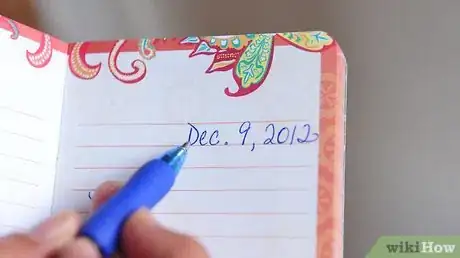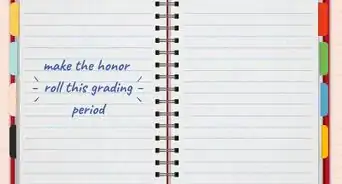X
wikiHow is a “wiki,” similar to Wikipedia, which means that many of our articles are co-written by multiple authors. To create this article, 42 people, some anonymous, worked to edit and improve it over time.
This article has been viewed 279,124 times.
Learn more...
Everyone who has one can tell you what a great invention the notebook is. Even people who have laptops and PDAs may still like to have a notebook. Albert Einstein, Ronald Reagan, Leonardo da Vinci and many other important people kept one. And so can you!
Steps
-
1Decide on the purpose for your notebook. Will you write down your inventions? Will you write ideas for a screenplay, or novel, or poem you will someday write? Will you write down thoughts and ideas related to a particular project? Or do you simply want to have a place to jot your to-do list or shopping list? Some people don't write any thoughts or family information in it, just things from their job or meetings they have attended. Others use their notebooks as a catch-all for the many ideas popping through their heads.
-
2Choose a notebook that is right for you. There is a wide variety of notebooks available, so take the time to look for a good one and don't be afraid to spend a little extra money. After all, your greatest work may be produced in this book! Here are some things to consider:[1]
- Portability and size. Notebooks work best when they are at hand when you need them. Choose something large enough to contain your writing and sketches and small enough to stow away. Would you like this notebook go in a purse or briefcase, in a pocket, in a binder or backpack?
- The writing environment. Do you need to write standing up, or on the go? Then you should choose something stiff-backed that you can hold with one hand while you write with the other. Does this notebook need to function in a special environment, such as a laboratory, a cleanroom, a kitchen, a factory, or a boat?
- Purpose. A blank book with a colorful, flowery cover may inspire you to write a journal, but it won't fit at a business meeting. A spiral notebook can open fully and fold back and it won't push itself closed while you try to write. Do you need ruled lines for writing or would you prefer blank pages or a grid to aid in sketching? Some notebooks even come printed with a musical staff.
- Divisions and markers. Do you want it to be divided into different categories, say, Homework, Ideas, Reflections, and To-Do Lists, or be more random or free-form, like a journal? You can buy pre-divided notebooks, or divide them yourself with stick-on dividers, flags, ribbons, or bookmarks.
- Legality. If this notebook will contain information that you may someday wish to get a patent, look for a bound book with pre-numbered pages. Understand the rules about keeping a notebook for such purposes.[2]
Advertisement -
3Write in it. Find your own style to make the most of your notebook. Use it the way that works best for you. There are many scenarios when it is a good idea to write something down in your notebook:
- When you are given a task.
- When you think of a new invention or idea.
- When you are given a compliment, recommendation, or piece of good advice.
- When you hear something funny or out of the ordinary
- When you want to remember something.
-
4Organize your notes, at least a little bit. Even if you don't think it matters, spending a little time now to organize your notes now can save you a lot of time later, when you're trying to find a piece of information, or can provide valuable later.
- Date each entry.
- Number the pages.
- Possibly title your entries.
- Write down background information, e.g. who attended a meeting.
-
5Keep it legible. Write at least well enough that you can read your notes. You want to be able to read your own handwriting. If you're keeping a notebook for official purposes, then make sure your handwriting is legible enough for others to read as well.
-
6Write often.
- Write consistently. Write at the same time every day, if possible. If you are a "lark", early morning can offer a productive time to write because your brain is fresh and most flexible and the activity can help shape the upcoming day. "Owls" may find evenings a better time to update their notes; it can be helpful to allot a few minutes before you go home from work or school to jot down today's important points and plan activities for tomorrow. Either way, writing at the same time every day can help to make keeping a notebook a habit - resulting in writing in it often.[3]
- Write in the little times between things, while you are standing in line or waiting for the next thing to happen, for instance.
- Write whenever the feeling strikes you. Ideas come and go, and unless you jot them down, you may forget. Remember the historian's mindset: If it's not written down, it didn't happen.
- It may help you to just babble on paper - to write whatever is going through your head until you think of something 'useful' to write. Your 'babbling' could turn out to be something important!
Advertisement
Community Q&A
-
QuestionWhat should I write in my notebook?
 Community AnswerYou should write anything that sparks your interest. It could be notes for school, it could be your agenda, or your after-school activities. It could even be notes on your favorite book or movie. The possibilities are endless--use your imagination!
Community AnswerYou should write anything that sparks your interest. It could be notes for school, it could be your agenda, or your after-school activities. It could even be notes on your favorite book or movie. The possibilities are endless--use your imagination! -
QuestionI want to write a quote which suits my day in every page. Is that OK?
 Community AnswerYes, of course! Whatever you want to do, it is yours to do whatever you want.
Community AnswerYes, of course! Whatever you want to do, it is yours to do whatever you want. -
QuestionHow do I stay motivated to write in my notebook?
 Community AnswerChallenge yourself to write a certain amount every day. If you're using the notebook to stay organized, update it at the same time every day to make it a habit.
Community AnswerChallenge yourself to write a certain amount every day. If you're using the notebook to stay organized, update it at the same time every day to make it a habit.
Advertisement
Warnings
- Don't lose your notebook.⧼thumbs_response⧽
- Be careful who sees the contents of your notebook. If it is private, keep it under wraps.⧼thumbs_response⧽
Advertisement
Things You'll Need
- A notebook
- Pen or pencil
- Eraser
References
About This Article
Advertisement





























































